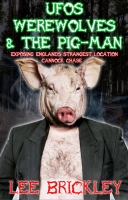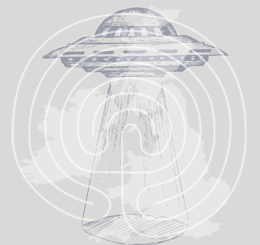2007 Alderney UFO Sighting
The UFO community is pretty strange. You can find literally hundreds of books and websites devoted to cases which have left not even the most insignificant evidence while cases with solid physical evidence (which may or may not be of extraterrestrial origin, but that’s another matter) tend to be forgotten or ignored. Also there’s a sort of weird fixation on old cases, while recent, highly interesting sightings tend to be shunned upon. A perfect case in point is a spectacular sighting which took place on April 23 2007 south of Alderney. While it generated a fair amount of interest at the time (with the BBC getting involved), it has been pushed to sides, as UFOlogists keep up their usual wild speculations.
Captain Ray Bowyer was flying an Aurigny Air Service Britten Trislander (a sturdy turboprop airliner) between Sothampton and Alderney when, during the last leg of the 40 minute flight, noticed a bright yellow light. At first he dismissed it as a reflection from a large commercial greenhouse in Guernsey but, having flown the route literally hundreds of time, quickly realized this was not the case.
The Trislander was flying at 4000 ft. There was a haze layer under 2000 ft and cloud layer at 10000 ft so there was neither direct sunlight nor possibility of seeing a reflection from the ground.
Since he was flying on autopilot, Captain Bowyer reached for his binoculars and observed the light. This turned out to be an “object with a definite shape: that of a thin cigar, or a CD viewed on edge with a slight incline. It was sharply defined and pointed at both ends. The aspect ratio was approximately 15:1 and I could clearly see a dark band two thirds of the way along from left to right while viewing it through the binoculars”.
As he drew nearer, Captain Bowyer became aware of a second identical shape beyond the first.
At this point he contacted Jersey Air Traffic Control (ATC) and the controller, Paul Kelly, confirmed two primary radar contacts south of Alderney. A primary radar contact means there’s a reflection from an object but the target is not returning transponder information, hence it has “no identity” as to speak. While modern military radars have the capability to extrapolate further information, civilian radars, as sophisticated as they are, rely solely on transponders to “identify” a target.
At this point the objects became visible without binoculars and the passengers became aware of them. The Trislander has no separate crew compartment: the pilot and the passenger are sitting in the same cabin. Jersey ATC contacted Captain Bowyer to inform him the objects were beyond his destination (“for which I was glad”) and were moving at just 6 knots, one to the north and the other south.
At this point Captain Bowyer realized he had underestimated the objects’ size. Though he always refused to speculate on this point he said they were effectively four-five times larger than he first thought.
While on landing approach Captain Bowyer noticed “a boundary layer between the two differences in colour, some sort of interface with sparkling blues, greens and other hues strobing up and down about every second or so”.
After the Trislander descended under the haze layer, the objects were lost from sight.
The sighting lasted fifteen minutes and “there had been no interference with any of the aircraft systems or instruments”.
After landing, Captain Bowyer asked the passengers if they had seen anything unusual and told them if they had and wanted to report it, they were to leave their name and number at the check-in desk.
He then proceeded to the operations department to make an official report, as required by law, informing the authorities that unidentified aircraft had been seen within controlled airspace where they shouldn’t have been. The report, together with the radar recording, was forwarded both to the Civil Aircraft Authority (CAA) and the Ministry of Defence (MOD).
The sighting was confirmed by another commercial pilot, Captain Patrick Patterson, flying a Blue Islands Bae Jetstream from the Isle of Man to Jersey.
Once the radar recording were analysed they showed two objects appearing simultaneously and disappearing simultaneously. Both the Trislander and the Jetstream (the two only known aircraft in the area at the time) appear in the radar recording, easily identified by their transponders.
Due to the haze layer, Captain Bowyer said the objects were not visible from ground but an anonymous person phoned BBC Radio that same day saying he had seen a “UFO” near the Les Casquettes lighthouse.
While the CAA took matter very seriously, “debunkers” were quickly on the case, dismissing the radar tracks as returns from a cargo ship. However their explanation falls short, as modern radars are equipped with sophisticated filters to prevent such tracks (the “angels” of the ’50s and ’60s), operators are trained to tell contacts apart and, much more critically, the ship would have to be literally sailing through the lighthouse at a given moment. A shipwreck would have been noticed for sure!
The MOD released a dry note stating this was not a military exercise or anything belonging to the them. The French military (contacted by the CAA as part of their customary investigation) replied the same, and neither service offered further help nor explanation.
Apart from the aforementioned half-baked debunking attempt nobody has offered any explanation, rational or otherwise.
Captain Bowyer himself has always refused to speculate on what he saw but expressed some views about “people who are fascinated with the subject of UFOs” I wholly agree with.
In the recent, award winning ‘UFOs: Generals, Pilot and Government Officials Go on Record’ Captain Bowyer (a contributor) added two things. The first thing is the objects size, which he put at “one mile”, an astonishing size but coherent with other “motherships” reported over the years by other pilots (including a much publicized sighting by the crew of a Japanese 747 freighter over the Artic). The second is that, according to further research, both the French and British military were well aware of the objects but “weren’t bothered by it”.
We could speculate at length why they weren’t “bothered” but without solid proof we could end up entangled in the usual net of conspiracy theories.
Nick Pope stated “NATO has very advanced aircraft you won’t see at Farnborough next year”. He was, of course, right as proven by the recent capture by the Iranian of a RQ170 drone by the Iranian (they most likely used Russian technology to interfere with the craft guidance system and force it to crash land, but that’s another matter completely). The RQ170 was previously known as the “Beast of Kandahar” since it was first spied at that Afghan location but its existence was always denied.
Intelligence-gathering platforms and operations have always been shady to say the least. For example very little is known of RAF operation over Soviet Russia.
But what good would be a one mile long aircraft easily traced by civilian radar is a complete mystery.
















Recent Comments